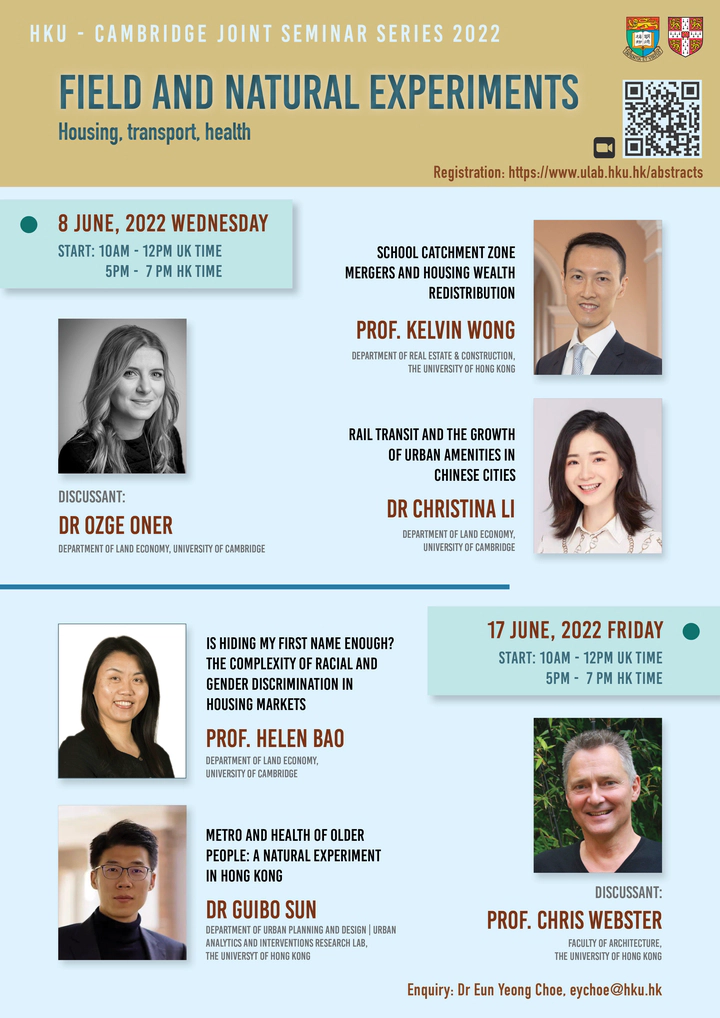Field and Natural Experiments: Housing, Transport, Health (Event 2)

Seminars 1
Is hiding my first name enough? The complexity of racial and gender discrimination in housing markets
Speaker
Prof. Helen Bao Department of Land Economy, University of Cambridge
Abstract
Implicit racial and gender biases can shape our behaviours and decisions significantly. For example, health care providers have implicit bias in terms of positive attitudes toward Whites and negative attitudes toward people of colour. Racial and gender discrimination is also prevalent in housing markets. The issue has been so serious that it made national and international headlines regularly. In response to a lawsuit against racial discrimination, Airbnb had to hide guests’ first name from rental hosts in Oregon, USA from January 2022. However, there is little evidence that such measurement is sufficient to combat racial and gender discrimination in housing markets. The objective of this study is to investigate whether behavioural interventions can effectively prevent racial and gender discrimination in rental housing markets. We conducted correspondence tests in the rental housing market in London, UK. We designed two behavioural interventions based on the taste-based discrimination theory and the statistical discrimination theory. Specifically, we provided employment information to help landlords to overcome statistical discrimination and included anti-discrimination messages to nudge landlords to adhere to social norm. Our empirical evidence shows that behavioural interventions worked. Both employment information and anti-discrimination messages reduced racial and gender discrimination significantly. However, anti-discrimination messages helped Polish, Indian, and Nigeran applicants by increasing their chance of getting a response from landlords, but hurts Asian applicants greatly. Also, the employment information intervention actually aggregated gender discrimination.
Racial and gender discrimination in housing markets is a complex issue and the landscape is ever changing. Hiding one’s first name is far from enough to solve the problem. We conclude by calling for more empirical studies to verify our findings by using data from housing markets in other parts of the world.
Seminars 2
Metro and Health of Older People: A Natural Experiment in Hong Kong
Speaker
Dr Guibo Sun Department of Urban Planning and Design, Urban Analytics and Interventions Research Lab, The University of Hong Kong
Abstract
CPublic transport accessible to older people may offer a transformative solution to achieving healthy ageing. However, the evidence to support such transport infrastructure modifications is unclear. Previous studies on public transport use and elderly health were mostly observational studies using cross-sectional data. Few studies have examined the before-and-after effects of a new metro, for example, to see if it improves elderly health.
We use a new metro line in Hong Kong as a natural experiment to examine the impact of the metro-led public transport intervention on elderly health. In Hong Kong, more than 90% of daily travel is made by public transport. The public transport modifications consist of the new metro line with eight stations and changes in the walking environment and bus services around the stations. We will look at the before-and-after differences in public transport use and health outcomes between elderly participants living in treatment neighbourhoods (400 m walking buffered areas of the new metro stations) and in control groups (living in comparable areas but unaffected by the new metro). Questionnaire-based baseline data were collected in 2019 before the COVID-19 pandemic, while some qualitative interviews are ongoing. Amid the pandemic, we conducted a quick telephone-based survey of COVID-19’s potential impact on public transport use behaviours of our elderly cohort in September 2020. After the new metro opened in June 2021, we conducted a follow-up survey in December 2021.
We aim to investigate if the new metro and the associated changes in the built environment affect public transport use behaviours, physical activity and wider health outcomes among the elderly (e.g., social inclusion, quality of life, subjective well-being). The research project collects practice-based evidence to enable future evidence-based planning for healthy ageing cities.
Discussant
Prof. Chris Webster Faculty of Architecture, The University of Hong Kong